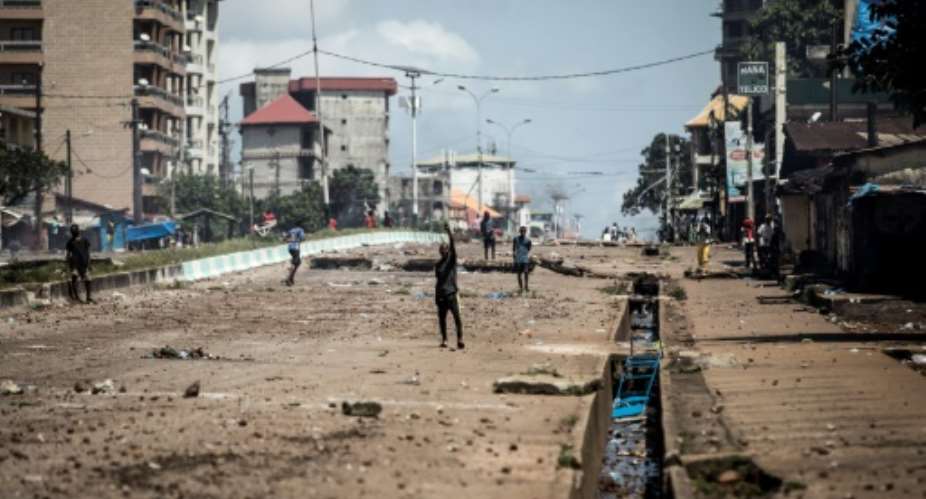International envoys met Guinea's leading opposition politician and government officials Monday to discuss the country's disputed election amid heightened security in the restive capital.
President Alpha Conde, 82, won a hotly contested October 18 election according to official results announced Saturday, setting the stage for a controversial third term.
But his main opponent Cellou Dalein Diallo, 68, disputes the results. He claimed victory last week, citing data his activists gathered at individual polling stations.
Diallo's self-proclaimed victory led to a week of clashes between supporters and security forces across the West African nation, in which the government says around 10 people died.
The opposition says 27 people were killed in the unrest. AFP was unable to confirm either death toll, however.
A diplomatic delegation from the United Nations, African Union and the 15-nation Economic Community of West African States landed in Guinea Sunday in the aftermath of the unrest.
The envoys -- who include ECOWAS Commission President Jean-Claude Kassi Brou and the UN special representative to West Africa, Mohamed Ibn Chambas -- met several ministers and government officials Monday.
An ECOWAS official in Conakry said they also spoke with representatives of Guinea's electoral commission and foreign diplomats.
Diallo told AFP that the envoys met him too, at his Conakry home which police have blockaded for days.
Anti-Conde protests were due to resume in the city early Monday and many shops stayed shut, but few people ended up hitting the streets in the end.
"In my neighbourhood, people say they are waiting to see the outcome of the joint mission," said a suburban resident who declined to be named.
Scars from the unrest were apparent in the Conakry neighbourhood of Wanindara -- an opposition stronghold -- with burned-out vehicles lying on the roadside.
Mohamed Saliou Camara, whose house was torched, said Conde and Diallo supporters had clashed in the area.
Much of the turbulence centres on a third term for Alpha Conde, whom opponents accuse of drifting into authoritarianism.
He pushed through a new constitution in March which he argued would modernise the country. But it also allowed him to bypass a two-term limit for presidents.





 Whoever participated in the plunder of the state must be held accountable – Jane...
Whoever participated in the plunder of the state must be held accountable – Jane...
 A vote for John and Jane is a vote to pull Ghana from the precipice of destructi...
A vote for John and Jane is a vote to pull Ghana from the precipice of destructi...
 I’ll repay your abiding confidence with loyalty, understanding and a devotion to...
I’ll repay your abiding confidence with loyalty, understanding and a devotion to...
 ‘I’ve learnt deeply useful lessons for the future' — Serwaa Amihere breaks silen...
‘I’ve learnt deeply useful lessons for the future' — Serwaa Amihere breaks silen...
 I’m sorry for the embarrassment – Serwaa Amihere apologises for leaked sex video
I’m sorry for the embarrassment – Serwaa Amihere apologises for leaked sex video
 Dumsor: Matthew Opoku Prempeh not in charge of Energy sector – Minority
Dumsor: Matthew Opoku Prempeh not in charge of Energy sector – Minority
 Adu Boahen’s murder: Police arrest house help who was in possession of deceased’...
Adu Boahen’s murder: Police arrest house help who was in possession of deceased’...
 Akufo-Addo nominates Felicia Attipoe as Tema West MCE
Akufo-Addo nominates Felicia Attipoe as Tema West MCE
 Election 2024: I can't have someone I defeated twice as my successor – Akufo-Add...
Election 2024: I can't have someone I defeated twice as my successor – Akufo-Add...
